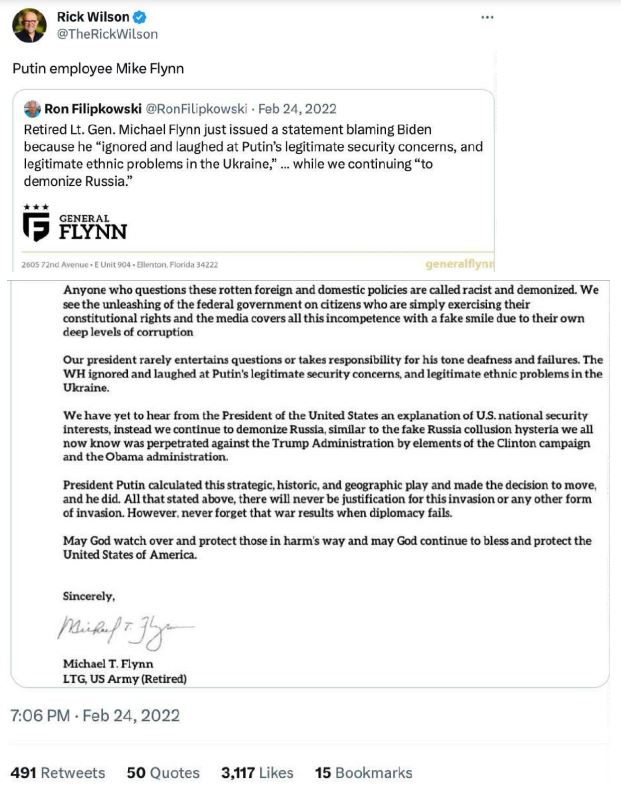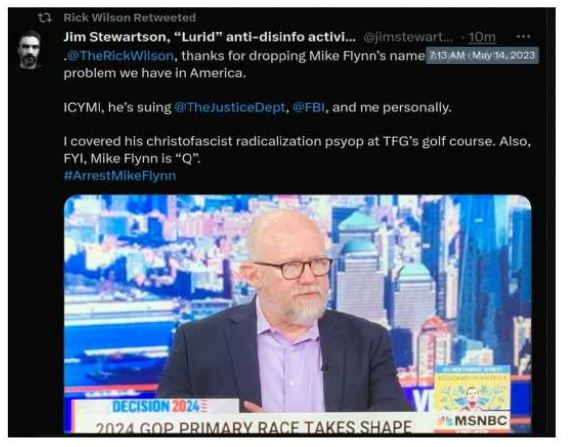Unfair and Impolite Tweets Aren’t Defamatory–Flynn v. Wilson
The plaintiff in this case is Mike Flynn, who served in important roles in the Trump 1.0 administration, got fired, and received a Trump pardon. I previously blogged his lawsuit against CNN. The defendants include Rick Wilson, a Lincoln Project co-founder with 1.5M followers at Twitter.
As the court summarizes: “Retired lieutenant general Michael Flynn sued Rick Wilson for defamation after Wilson referred to Flynn in a tweet as ‘Putin employee Mike Flynn’ and retweeted ‘FYI, Mike Flynn is Q.'” The court dismisses Flynn’s case on summary judgment.
The first tweet in question:
The court says “the ‘Putin employee’ statement is nonactionable rhetorical hyperbole or opinion.” Flynn asked the court to evaluate the “employee” statement in isolation, but the court says “that is not what a reasonable reader of Wilson’s Twitter feed would think Wilson was trying to communicate.” Instead, the court considers Wilson’s four added words alongside the supporting materials:
A reasonable reader of Wilson’s response to Flynn’s letter would instead understand Wilson to be expressing essentially the same thing he wrote in his book, namely, what else would you expect from someone “in bed with the Russians”? As with Flynn’s actual intimate relationships, his actual economic relationship with Putin (if any) is immaterial….
Wilson’s tweet appears together with the text of Flynn’s letter. A reasonable reader would understand that Wilson was simply reacting imaginatively to Flynn’s fully disclosed letter. That reasonable reader encountering Wilson’s tweet would also have had at their mental disposal the prior widely publicized news stories about Flynn’s purported connections with Russia—stories that indeed would have been familiar to essentially anyone who followed the news during the first years of the Trump presidency. A reasonable reader of Wilson’s tweet simply would not think that Wilson was responding to Flynn’s letter about the invasion of Ukraine by purporting to make a literally true, factual claim about Flynn’s employment status.
I would analogize this ruling to the category of cases where hyperlinking to sources makes the preceding characterization of those sources into non-actionable opinions, even if the characterization otherwise looks fact-like. See, e.g., Adelson v. Harris. This has become a major qualification of online defamation law.
Flynn argued that Wilson had become hyper-partisan. (Sigh…every accusation is an admission…). The court says “Wilson’s political orientation simply underscores that reasonable readers of Wilson’s Twitter feed will expect Wilson to be hyperbolic and highly subjective.” Because anyone still tweeting on Twitter is probably hyper-partisanized, Twitter really has become a defamation-free zone.
Tweet #2
The court says that “Flynn has a complicated relationship with the QAnon movement,” a line that most of us would prefer not to see written in a court opinion…
The court says that Wilson’s actual malice is required for this defamation claim, and Flynn didn’t properly allege it. The court then bizarrely says Flynn might actually be Q:
although the record persuades us that most QAnon adherents believe that there is at least one Q (and maybe more), we cannot discern much else about that person or persons, whether inadvertently or by design…If Flynn is not Q (or one of the Qs), then it presumably would not have been hard for him to have filed an affidavit with the trial court to that effect…. if, as the record suggests, the identity of “Q” poses an intractable proof problem—due perhaps to the very nature of QAnon—that is Flynn’s problem and not Wilson’s.
🤯 (I tried to think of a good meme about imposters or secret aliases to include here, but I couldn’t quite figure out the right one. Send me your suggestions please or post them in the comments).
After saying that Flynn didn’t show Wilson’s actual malice, the court then reverses course and says “on this record, “Flynn is Q” becomes just another example of generally nonactionable name calling that lacks a verifiable factual core.” OK, so which is it–is it nonactionable opinion or a fact claim made without sufficient scienter? The court opinion is internally inconsistent about why Flynn loses, or perhaps it was inarticulately saying he found multiple ways to lose.
 By anchoring its ruling in the prima facie case of defamation, the court sidesteps other interesting analytical questions regarding liability for retweeting. For example, a verbatim retweet ought to be protected by Section 230 (not mentioned by the court); and even a quote-tweet should have qualified for 230 except for any new remarks added bythe quote-tweeter. These issues didn’t matter because the court effectively says the original tweet wasn’t defamatory (it was an opinion) and/or Wilson didn’t have sufficient scienter about the tweet’s veracity when he retweeted.
By anchoring its ruling in the prima facie case of defamation, the court sidesteps other interesting analytical questions regarding liability for retweeting. For example, a verbatim retweet ought to be protected by Section 230 (not mentioned by the court); and even a quote-tweet should have qualified for 230 except for any new remarks added bythe quote-tweeter. These issues didn’t matter because the court effectively says the original tweet wasn’t defamatory (it was an opinion) and/or Wilson didn’t have sufficient scienter about the tweet’s veracity when he retweeted.
Court’s Conclusion
The court leaves Flynn with some parting wisdom:
We have the privilege of living in a country with a “profound national commitment to the principle that debate on public issues should be uninhibited, robust, and wide-open, and that it may well include vehement, caustic, and sometimes unpleasantly sharp attacks.” Like it or not, such attacks are a characteristic feature of our democracy—regardless of the political persuasion of the speaker and regardless of the political persuasion of the public figure on the receiving end of that speech. As the trial court noted, Wilson’s tweets may not have been polite, and they may not have been fair. But the First Amendment required neither, and so we affirm.
I believe that’s judicial-speak for “suck it, Flynn.”
While the court is correct that the First Amendment doesn’t require fairness or politeness, our discourse norms have reached a level where people are often shouting at each other, and not even trying to work together to develop shared understandings of the truth. Flynn claims to be a victim in this case, but I wonder if he ought to reflect upon his own contributions to this discourse dynamic?
Also, this case highlights the jumbled attitudes of the MAGA crowd about defamation claims. On the one hand, name-calling, taint-by-association, and conspiracy theory implications are everyday standard rhetorical tricks of hyper-partisans, including MAGA stans, and they should be worried about strong defamation rights that could impose accountability for their words. As we’ve already seen, defamation claims are hitting some hardcore MAGA stans hard. And yet…some MAGA stans are quick to file defamation claims, even when an outsider might view that as a thin-skinned response. The only clear through-line I see is the quest for raw power, i.e., strong defamation rights when you’re a plaintiff, weak defamation rights when you’re a defendant. That’s the antithesis of the rule of law, but the rule of law already feels like a quaint notion in the mid-2020s.
Case Citation: Flynn v. Wilson, 2024 WL 5063563 (Fla. Dist. Ct. App. Dec. 11, 2024). Rick Wilson’s statement about the ruling.
Selected Posts on Liability for Retweeting
* Trump’s Retweets Are Criminal Contempt of a Gag Order–People v. Trump
* Retweets ≠ Endorsements (As a Matter of Law)–Flynn v. CNN
* Section 230 Protects Retweeting–Banaian v. Bascom
* Section 230 Doesn’t Protect Quote-Tweeting–US Dominion v. Byrne
* Retweets Didn’t Reset Defamation Statute of Limitations–Crosswhite v. Reuters
* Can a Retweet Constitute Copyright Infringement? Uh….–Bell v. Chicago Cubs


